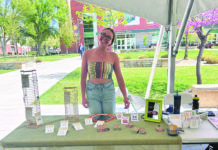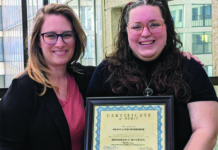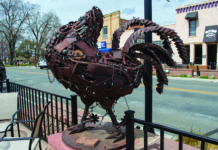On March 30 and 31, Colorado Mesa University’s Moss Performing Arts Center performed an operatic adaptation of the classic Shakespeare play, “A Midsummer Night’s Dream.” As part of the growing opera program at CMU, the show is the first opera to be performed in Robinson Theatre. The music is composed by Benjamin Britten and CMU’s production features guest countertenor Nate Pence as the character Oberon.
The libretto of the opera, adapted from Shakespeare’s original play by the composer and Peter Pears, follows a complex story of mixed-up love affairs, aristocrats and performers, and supernatural intervention.
The morning of March 29, the opera was also performed in an open dress rehearsal for a packed auditorium of high school students, who were invited from arts programs across D-51 as a recruitment method.
Levi Willis, who plays the character Bottom, says that performing the opera in Robinson Theatre presents new challenges and experiences that the opera program has not encountered in the past. With increased technical freedom comes both room for creativity and a need for high skill in lights, sound, blocking and set design.
“It’s kind of a big deal because we’re going to be using a lot more than we usually do,” Willis said. “It’s a big step forward for our opera program.”
The preparation process began with auditions last November. From there, students were expected to obtain the score over break and prepare for rehearsals in January.
“It’s been pretty rough as far as getting your ear tuned,” Willis said. “Lots of hours. It’s probably about 5 or 6 hours every day, whether it’s sitting in your car with your phone plugged in, just practicing the part over and over and over again.”
Official group rehearsals take place in the evening, and for the two weeks leading up to the performance, daily rehearsals stretched into the late hours of the night.

“It’s a long process, but it’s worth it,” Willis said. “You have to know the music, know the part, memorize the words… all this technical brain stuff, and you start losing track of your mind. I think the best part is when, finally, you don’t think about it. Maybe you mess up, but you are still enjoying it. You’re creating music, you’re creating a moment, you’re creating memories… you’re remembering why you do what you love.”
While the audience might have a difficult time understanding Shakespearean English or keeping up with Britten’s complicated composition style, Willis said they primarily watch the performance to identify with the characters and enjoy the plot.
“[The audience] cares about the story. You can develop a character that people can fall in love with, even if you don’t do everything exactly right. That’s what has led me to here: enjoy the person you can create on stage,” Willis said.
The opera combined classical elements with modern humor; the final act of the performance presented costumes and a farcical subplot that earned a noisy standing ovation from Thursday’s high school audience.
In addition to providing entertainment for students and the community, the opera program also hopes to help propel its performers and crew into their careers.
“One of the things they’re focusing on is making sure that you get roles and opportunities that you will most likely be apt to do in the real world,” Willis said. “On top of that, you learn how to practice and devote your time to this. You learn a lot about you can personally strengthen yourself with your repertoire and getting the role under your belt so that next time, it’s easier.”
The opera program has also allowed students to find a community with each other as they come together for a common purpose.
“This is a project that requires a lot of work, and it’s not a solo effort,” Willis said. “I think one of the things I’m going to take away is that we need to appreciate everyone. We need to encourage each other to do the best we can when we’re in the moment.”





